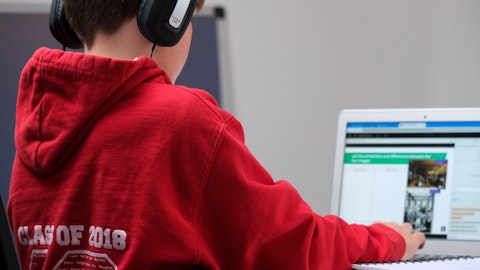Luis von Ahn: Well, thank you for the great question. Yeah, we’ve had a really good growth. And honestly, it’s exceeded our expectations. The main two things that have made us grow so fast. The first one is just product improvements. I mean, we run hundreds of A/B tests every quarter and they compound. And so our product is just significantly better than it was two years ago. And so that’s the biggest thing. Then the second biggest thing is we just got a lot better with our marketing. And the combination of getting much better with marketing and the getting better has made it so that Duolingo has really struck a cord with this — it’s like now part of the and part of the reason that we’ve exceeded our expectations is because things have happened that we didn’t — there was no way for us to expect — we could not expect that, the Barbie movie was going to add a Duolingo in there.
We could not expect that, there would be SNL skits and stuff like that. So that — I think that’s the combination of what has happened. I mean, we’re very happy but it’s been hard to also forecast.
Ralph Schackart: Great. And then maybe Matt in the prepared remarks you talked about the potential ARPU to improve. And I think you’ll be coming up on two years since you did some of the price adjustments in Europe just maybe give some color on how ARPU may improve going forward? Thank you.
Matthew Skaruppa: Yeah. Thanks Ralph. So ARPU has been impacted by foreign currency. That’s hard to predict. But the other thing was the regional pricing that you mentioned. So we did that about a year ago. That was Q2 of 2022. So that impacted bookings in that quarter and then going forward and has flowed through to revenue. So that was expected and that’s what we mentioned on the last call. In terms of this quarter, there was some experiments we ran that were really effective at driving free-to-pay conversion outside the US. So that kept it range bound this quarter. I think the reason we continue to think we’ll see improvements is the starting to lap the pricing changes that we did in Q2 of last year. And also, our pricing philosophy is one that we continue to experiment with pricing and we’ve added a lot of value to the product over time. So we’ll experiment with raising prices over them as well.
Ralph Schackart: All right. Thanks.
Deborah Belevan: Next question comes from Justin Patterson of KeyBanc.
Justin Patterson: Great. Thank you very much, and good afternoon. I appreciate the call out on experiments in the letter. Luis, as you’ve expanded the range of products in the core app to music and now math, how should we think about just the pace of experiments and A/B test really ramping to really kind of optimize these new elements within the app? And then for Matt, the incrementals in the business remain very attractive north of 50% margins within the Q4 guide. So as you’re sitting here today thinking about 2024 budgets, what are really the key investment areas that you’re thinking about to keep driving this healthy growth going forward? Thank you.
Luis von Ahn: Thank you, Justin and excellent shirt. So you asked about math and music and what that’s going to do to our experiments. So I think it’s worth just saying what we did what — we had a — well we still have a math app and we’ve been developing a music course. We decided the best strategy was to put both the math and music course inside our main app. There’s many reasons for this, but the biggest reason is that we can immediately take advantage of any positive change that we do in the main app for engagement or for monetization or for anything immediately you take advantage of those because math and music are just going to be other courses in the app just like French or Spanish, just as if we were adding another language.
So that will — what that will do is it will allow us to grow these courses or the subjects a lot faster than if they were independent apps. We’re very happy with that. Now I should mention and I should caution, the main thing that we are concentrated on for the short term is really making both the math and music courses more comprehensive and really work on them a lot. We haven’t even launched them. And technically, they are going to be launched to all our users on iOS starting tomorrow. So once we launch them, we’re going to be working specifically on the courses. So I would not expect too much increase in revenue in the short term. But over the long term, the hope is that the Duolingo gets known not just as a language learning app, but so as an app where you can learn math and music so we’ll start attracting users for that.
And a lot of the monetization experiments that we run will apply to math and music. So that’s the idea. My sense is that it will probably slightly increase the pace of experimentation. And so that basically answers your question.
Matthew Skaruppa: Yeah. And to follow up on budgeting in 2024. The amazing thing about the business right now is that the core business we’re still early in the opportunity. So we have tons of room to run. So the vast majority of our investment next year will be in the core business. Just to remind everyone how we invest in that. There’s really three areas we invest in. We invest in growth. A bunch of engineers and product managers and designers who help design experiments to drive things like innovations in the street mechanic or make the app more social. We invest in monetization. So driving free-to-pay conversion. And then we invest in learning to make our app more effective. That’s going to make up the vast majority of our investment next year just like it did this year.
We have incremental layers on top of that that we add. So we’re investing Max. We’re investing in math and music like we just mentioned. But I don’t want folks to lose sight of the fact that the investment we’re going to make next year is going to be like this year, which is in that core app which has great growth momentum and a huge market that we’re still growing into.
Justin Patterson: Thank you both.
Deborah Belevan: Thanks, Justin. And next question comes from Ryan MacDonald of Needham.



